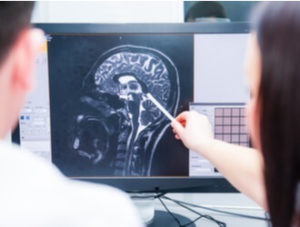
The symptoms of TBI can take months or even years to surface; additionally, with each individual’s situation being different, the long term consequences and outcome is almost impossible to predict. What we can predict is that there is a high likelihood of some type of long term effects from traumatic brain injuries; including increased susceptibility to future brain cell deterioration through swelling and the decreased ability of the cells to regenerate.
Long Term Effects of Brain Injury
Overtime traumatic brain injuries result in progressive brain deterioration which was observed through increased inflammation of the brain and decreased cell regeneration. Even though TBIs are already considered severe brain injuries, there is now evidence that the long term consequences of the inflammation and cell regeneration problems will cause victims of TBI to suffer more stark long term neurological deficits and make them more susceptible to Alzheimer’s, Parkinson’s, and post-traumatic dementia. Long-term consequences for those suffering traumatic brain injury, from University of South Florida (USF Innovation), 1/4/2013, stating, “Our study found that cell proliferation was significantly affected by a cascade of neuroinflammatory events in chronic TBI and we identified the susceptibility of newly formed cells within neurologic niches and suppression of neurological repair”. Despite this poor outlook, researchers did find that intervention even during the chronic stages of TBI could help slow this deterioration.
The Centers for Disease Control have found that the long term effects of TBI also include the permanency of many symptoms. Long term changes to memory and reasoning, touch, taste and smell, communication and understanding, as well as emotional stability. As with any disease or injury, different people respond and heal differently. The long term symptoms are very real and become the new normal for victims of brain injury. Decreased brain functioning can be a permanent reality that a victim must learn to live and cope with. Not only does a TBI affect the future chances of age related brain disease, but it sentences a victim to potentially a lifetime of frustration, inability to think clearly, lapses in memory, and mood swings. Additionally, long term affects could also affect balance and coordination which impacts everyday life and mobility.
Neuroscience is getting better every year with the understanding and treatment of the long term effects of TBI. Especially since so many of our young men and women in the military have recently suffered head injuries and with the rise in awareness also brought on about through sports from the professional level all the way down to high school and kids’ sports, particularly football. The diagnosis and treatment of head injuries and the resulting symptoms is getting better with technology, this will improve treatment over the years but will also allow medical science to continue to diagnose the consequences related to head injuries that were previously unknown.
Contact the Traumatic Brain Injury Lawyers in St. Louis if You Have Long Term Effects From Your Head Injury
The long term effects of a brain injury are important in a personal injury claim. Proper diagnosis and proof of the injury and the medical literature regarding the long term consequences is all relevant to a personal injury trial when determining the amount of damages that will fully compensate you for the harms and losses suffered. If the jury is not told about the long term consequences of head injuries then they cannot be expected to consider those factors when determining the amount of their verdict.
If you have suffered a traumatic brain injury or even a mild head injury from a car or bike accident, call our brain injury lawyers today for a free consultation and evaluation of your case. (314) 863-0500 or contact us online.





 Site by Consultwebs.com: Law Firm Website Designers/Personal Injury Lawyer Marketing.
Site by Consultwebs.com: Law Firm Website Designers/Personal Injury Lawyer Marketing.